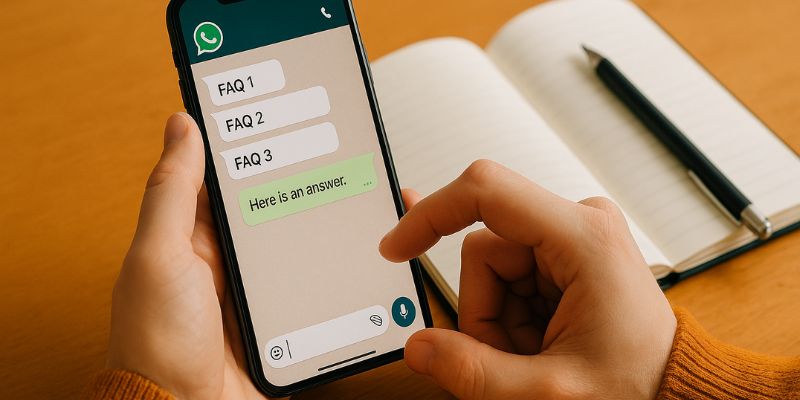Quickly Answer FAQs via WhatsApp
In today’s fast-paced digital landscape, businesses and individuals are constantly seeking efficient ways to communicate and resolve queries. WhatsApp, a globally recognized messaging app, offers a remarkable platform for addressing frequently asked questions (FAQs) quickly and effectively. This article delves into the various aspects of using WhatsApp for this purpose, providing insights into its advantages, practical steps for implementation, and real-world examples to enhance understanding.
Why Choose WhatsApp for FAQs?
WhatsApp stands out as a preferred choice for handling FAQs due to its widespread acceptance and user-friendly interface. But why exactly is it so effective?
- Accessibility: With over two billion users worldwide, WhatsApp ensures that a vast number of people can be reached effortlessly. It crosses geographical boundaries, making it accessible to both urban and rural populations.
- Instant Communication: The app supports real-time messaging, allowing businesses to respond to customer queries instantly, thereby enhancing customer satisfaction and trust.
- Cost Efficiency: Unlike traditional customer service channels which may require significant investment, WhatsApp operates over the internet, reducing costs associated with phone calls and physical setups.
These features make WhatsApp a compelling tool for businesses looking to streamline their customer service processes.
Setting Up WhatsApp for FAQ Responses
To leverage WhatsApp effectively for handling FAQs, certain steps must be followed. Here’s how to go about it:
- Create a Business Account: Start by setting up a WhatsApp Business account. This allows you to access features specifically designed for business communication, such as automated messages and quick replies.
- Compile FAQ List: Identify the most common questions your audience asks. This could be related to product details, shipping information, or service inquiries.
- Automate Responses: Utilize WhatsApp Business’s automation features to pre-program responses to these FAQs. This saves time and ensures consistency in the information provided.
- Train Your Team: Ensure that your customer service team is well-versed in using WhatsApp for communication. Regular training sessions can help them understand the nuances of interacting with customers via this platform.
Implementing these steps can significantly streamline your FAQ response process.
Enhancing Customer Experience through WhatsApp
WhatsApp not only facilitates quick FAQ responses but also enhances the overall customer experience. Here’s how:
- Personalization: Businesses can personalize their interactions by addressing customers by name and referencing previous conversations, making the customer feel valued.
- Rich Media Sharing: WhatsApp supports the sharing of images, videos, and documents. This enables businesses to provide detailed explanations and visual aids to customers, improving understanding and engagement.
- Feedback Collection: After resolving queries, businesses can use WhatsApp to collect customer feedback, helping them to continuously improve their service offerings.
These strategies contribute to a more engaging and satisfactory customer journey.
Real-World Examples of WhatsApp for FAQs
Many businesses are already reaping the benefits of using WhatsApp for handling FAQs. Consider the following examples:
- E-commerce Retailers: Companies like Amazon use WhatsApp to notify customers about their order status, delivery updates, and to address any post-purchase inquiries.
- Healthcare Providers: Clinics and hospitals use WhatsApp to schedule appointments, send reminders, and answer common health-related questions, thus reducing the burden on their call centers.
- Educational Institutions: Schools and universities use WhatsApp to communicate with students and parents about schedules, events, and administrative processes, making information dissemination more efficient.
These examples illustrate the diverse applications of WhatsApp in various industries.
Challenges and Solutions
While WhatsApp offers numerous benefits, there are challenges that businesses might face:
- Data Privacy: Concerns about data security can be addressed by ensuring compliance with privacy regulations and by educating customers about the platform’s security features.
- Response Time Management: To manage response times effectively, businesses can set realistic expectations with customers regarding response times and use automation strategically.
- Scalability: As the volume of queries increases, businesses might struggle to maintain prompt responses. Investing in AI-driven chatbots can help manage high volumes effectively.
Addressing these challenges can help maximize the benefits of using WhatsApp for FAQs.
Conclusion
In conclusion, WhatsApp presents a powerful tool for businesses and individuals looking to efficiently manage and respond to FAQs. Its accessibility, cost-effectiveness, and ability to enhance customer experience make it a valuable asset in any communication strategy. By implementing thoughtful strategies and overcoming potential challenges, businesses can fully leverage WhatsApp to improve customer satisfaction and streamline their operations.
FAQs
Is WhatsApp suitable for all types of businesses?
Yes, WhatsApp can be adapted for use in various industries, including retail, healthcare, and education, due to its versatile features.
How can businesses ensure data privacy on WhatsApp?
Businesses should comply with privacy regulations and inform customers about WhatsApp’s end-to-end encryption to enhance trust.
Can WhatsApp handle a high volume of customer queries?
Yes, with the use of automation and chatbots, WhatsApp can efficiently manage large volumes of inquiries.
What role does automation play in using WhatsApp for FAQs?
Automation allows for quick and consistent responses to common questions, improving efficiency and customer satisfaction.
Can WhatsApp improve customer satisfaction?
Absolutely, through instant communication, personalized interactions, and the ability to share rich media, WhatsApp significantly enhances the customer experience.
